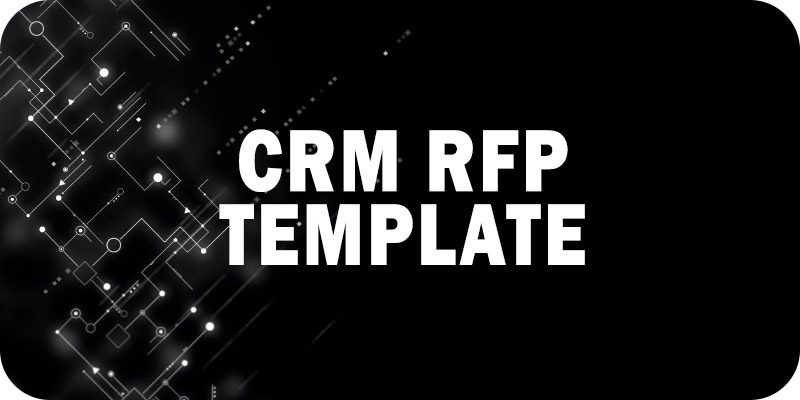An Example CRM RFP Template from Solutions Review


The editors at Solutions Review have compiled this example CRM RFP template to help your organization select the best enterprise software for its business needs.
As companies grow, they often need a more sophisticated system to manage their customer relationships. A customer relationship management (CRM) system can help you keep track of leads, opportunities, and customers, providing insights into your business that can help you make informed decisions. However, choosing the right CRM system for your business can be daunting. One way to simplify the process is by using a request for proposal (RFP) template to solicit proposals from potential vendors.
In addition to simplifying the vendor selection process, using an RFP template can also offer other benefits. For example, it can help you standardize your requirements and evaluation criteria, making it easier to compare proposals from different vendors. It can also help ensure you don’t overlook critical requirements or considerations when evaluating solutions.
With that in mind, the Solutions Review editors have compiled an example CRM RFP template to help you and your team get started.
An Example CRM RFP Template
A CRM RFP template should include essential information about your business, its goals for the CRM it wants to work with, and the requirements the solution must have. The scope of work should be clearly defined, outlining what the company expects the CRM system to do and including details about any required features or functionalities. Here’s a breakdown of what a CRM RFP template should include:
- Overview: To start, briefly introduce your business, its goals, and why you’re looking for a CRM solution. This is also the section where you can indicate the outcome(s) you expect from implementing a CRM solution.
- Scope of Work: Provide a detailed description of the proposed CRM system’s scope of work. You will need to outline what you expect the CRM system to do for your business and include details on any specific features or functionalities that you require.
- Technical Requirements: Next, list all the technical requirements for the proposed CRM system. Include information on hardware, software, and networking requirements, and provide any additional technical requirements that may be important.
- User Requirements: You must also describe the users using the CRM system. This involves outlining the specific user requirements or workflows critical to your business. You should also provide details on the user training and support you want to receive.
- Vendor Requirements: Outline your vendor requirements, which should involve details on vendor experience and expertise. Also include any financial needs, such as pricing or payment terms.
- Implementation Requirements: Vendors will need to know what your ideal or required timeline for implementation is. You should provide details on any needed data migration or integration with other systems you have and indicate any customization or configuration requirements.
- Support and Maintenance Requirements: Describe your support and maintenance requirements for the CRM system. Include details on technical support and issue resolution alongside information on maintenance and upgrade requirements.
- Evaluation Criteria: Outline the criteria that you will use to evaluate proposals. Include both mandatory requirements, evaluation criteria, and the weighting or importance of each standard.
- Proposal Submission: Provide instructions on how vendors should submit proposals. These instructions should include deadlines for submitting proposals and an overview of the information each vendor’s proposition must provide.
- Terms and Conditions: Finally, include any terms and conditions that will apply to the procurement process, including details on contract terms, conditions, and any additional requirements or information a vendor should know.
By including these elements in your CRM RFP template, you can ensure that vendors have a clear understanding of your requirements and can provide proposals that meet your specific needs. Additionally, having a well-constructed CRM RFP can help you evaluate proposals consistently and systematically, making it easier to select the best CRM system for your business.




















